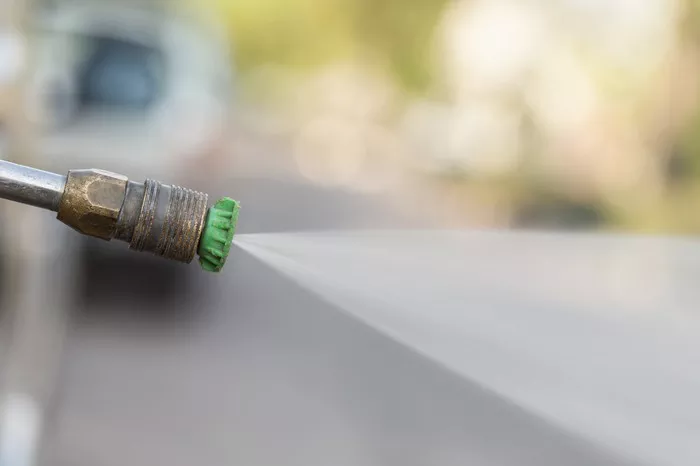Pressure washers are powerful tools designed to blast away dirt, grime, and debris from various surfaces using high-pressure water. From driveways and sidewalks to outdoor furniture and vehicles, pressure washers offer an efficient and effective solution for cleaning a wide range of outdoor spaces and objects. Their ability to quickly remove stubborn stains and buildup makes them a popular choice for homeowners and professionals alike.
The benefits of pressure washers are manifold. They provide a quick and efficient means of cleaning surfaces that would otherwise require significant time and effort. Whether it’s removing years of grime from a driveway or revitalizing a weathered deck, pressure washers offer a thorough clean that can rejuvenate outdoor spaces. Additionally, pressure washing can help prevent the growth of mold, mildew, and algae, which can pose health hazards and cause damage to surfaces over time.
While pressure washers are undoubtedly useful tools, it’s essential to recognize that they’re not suitable for every cleaning task. Improper use of a pressure washer can lead to damage to surfaces, injury, or even death. Understanding when not to use a pressure washer is crucial for ensuring both the safety of the operator and the integrity of the surfaces being cleaned.
Key Points on When Not to Use a Pressure Washer
1. Delicate Surfaces
Wooden surfaces, such as decks, fences, and furniture, are particularly susceptible to damage from pressure washing. The high-pressure water can penetrate the wood’s surface, leading to splintering, warping, and other forms of damage. Similarly, painted surfaces are at risk of having the paint stripped or chipped away by the force of the water. Stucco and delicate masonry can also be damaged by the intense pressure, potentially causing dislodgment of stucco or mortar.
2. Electrical Components and Wiring
It should go without saying, but pressure washers and electrical components do not mix. Avoid using a pressure washer near electrical outlets, light fixtures, or any wiring. The presence of water increases the risk of electric shock, which can have fatal consequences.
3. Windows and Seals
Pressure washing windows may seem like a quick way to achieve streak-free cleanliness, but it comes with significant risks. The force of the water can crack glass or damage seals, leading to leaks and other issues.
4. Roof Shingles
While it may be tempting to blast away moss and algae from roof shingles, doing so with a pressure washer can cause more harm than good. The high-pressure water can lift or break shingles, leading to leaks and costly repairs.
5. Gutters and Downspouts
While pressure washing gutters can be an effective way to remove debris and restore proper drainage, it’s essential to exercise caution. The force of the water can loosen or dislodge gutters and downspouts, leading to damage to the gutter system and potentially causing injury to bystanders below.
6. Cars and Vehicles
While pressure washing can be an effective way to clean the exterior of vehicles, it’s important to avoid sensitive areas such as car engines and seals. The high-pressure water can damage delicate components and lead to costly repairs.
7. People and Pets
This should go without saying, but it’s worth emphasizing: never use a pressure washer on living beings. The force of the water can cause serious injury or even death. Keep a safe distance from people and pets when operating a pressure washer, and never aim the spray nozzle at anyone or anything living.
8. Health Hazards
Pressure washing mold, mildew, or other hazardous materials without proper protective gear can pose significant health risks. Exposure to mold and mildew can cause respiratory issues, while chemicals used in pressure washing solutions can be harmful if ingested or come into contact with the skin or eyes.
9. Environmental Considerations
Pressure washing can have environmental consequences if not done responsibly. Chemicals used in pressure washing solutions can harm plants and aquatic life if allowed to enter water sources, while excessive water usage can contribute to water waste and runoff pollution.
Safety Tips
To minimize the risks associated with pressure washing, it’s essential to follow these safety tips:
1. Always wear protective gear, including goggles, gloves, and appropriate clothing, to protect against flying debris and chemical exposure.
2. Before beginning any pressure washing job, test a small, inconspicuous area to ensure that the pressure and nozzle settings are appropriate for the surface being cleaned.
3. Use the appropriate nozzles and adjust the pressure settings as needed to avoid causing damage to surfaces.
4. Follow the manufacturer’s guidelines for operating the pressure washer safely and effectively.
5. Keep bystanders, including children and pets, at a safe distance during operation to prevent accidents and injuries.
Conclusion
While pressure washers are valuable tools for cleaning a wide range of surfaces, knowing when not to use them is essential for ensuring both safety and effectiveness. By avoiding delicate surfaces, electrical components, windows, roof shingles, gutters, vehicles, people, and pets, as well as taking precautions to protect health and the environment, users can enjoy the benefits of pressure washing while minimizing the risks. Encouraging responsible pressure washer usage is key to achieving effective and safe cleaning outcomes.

